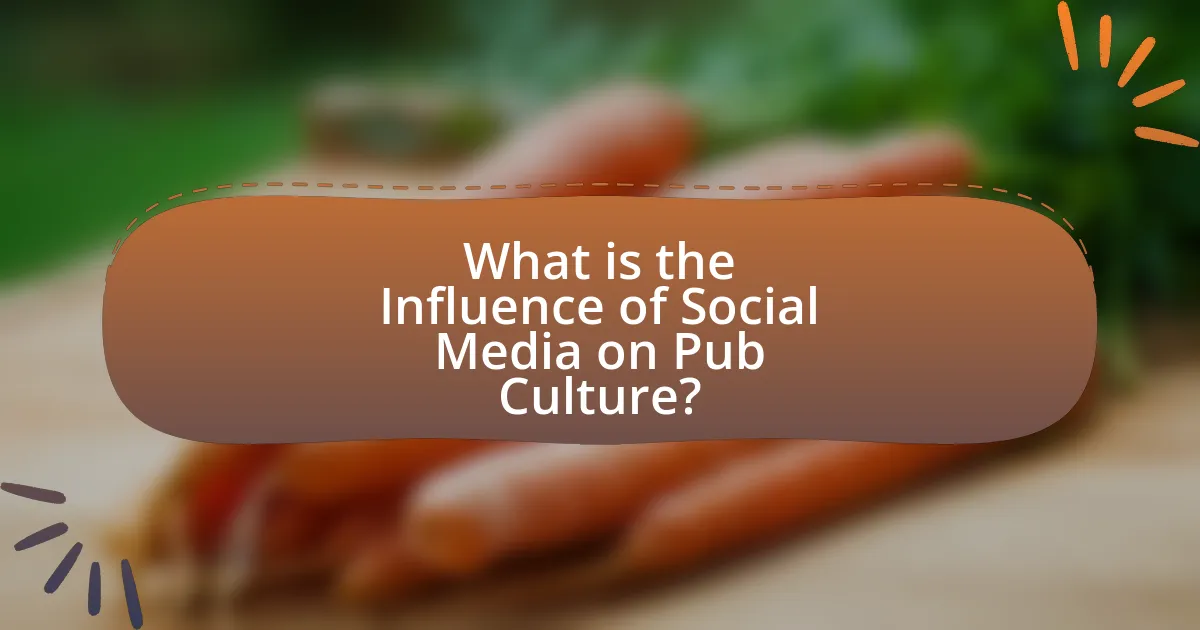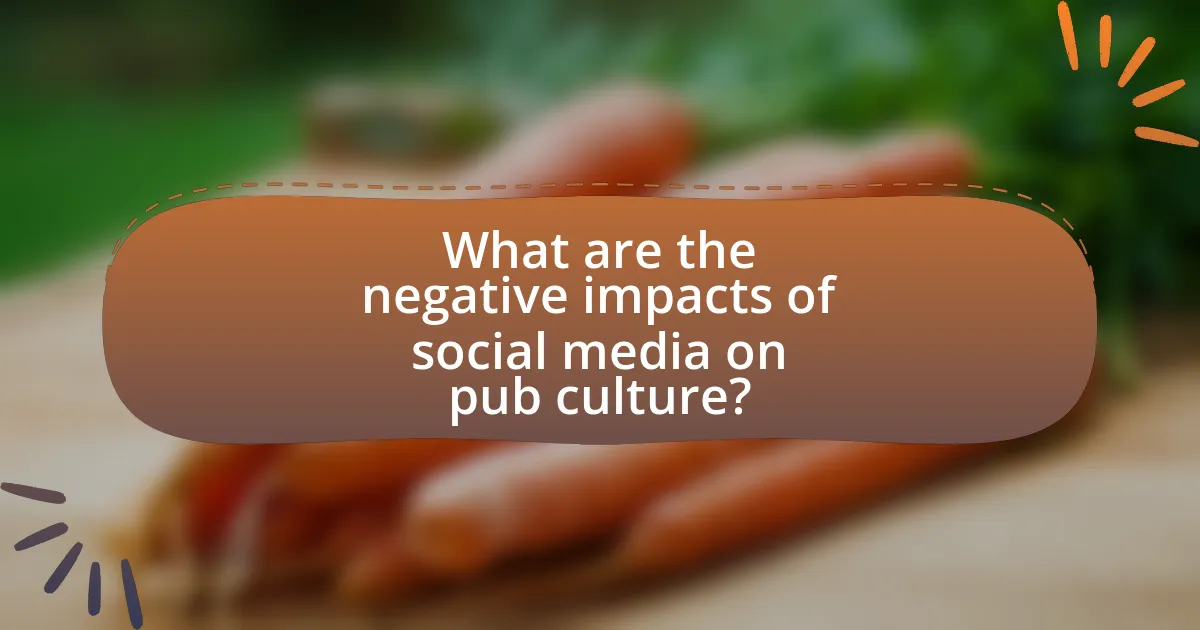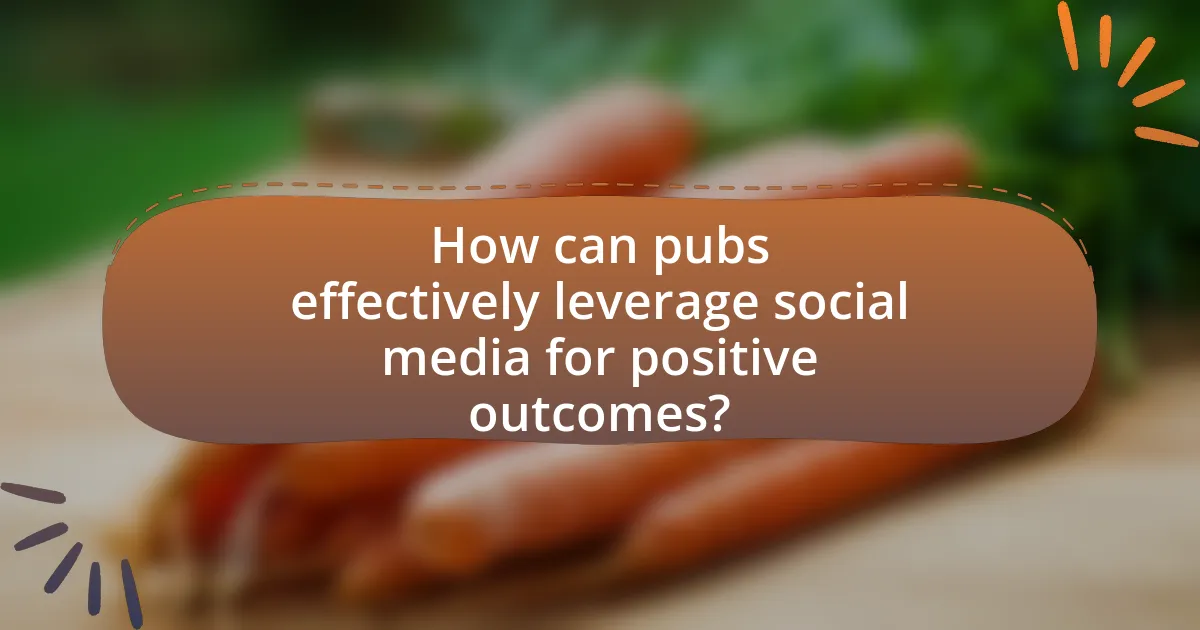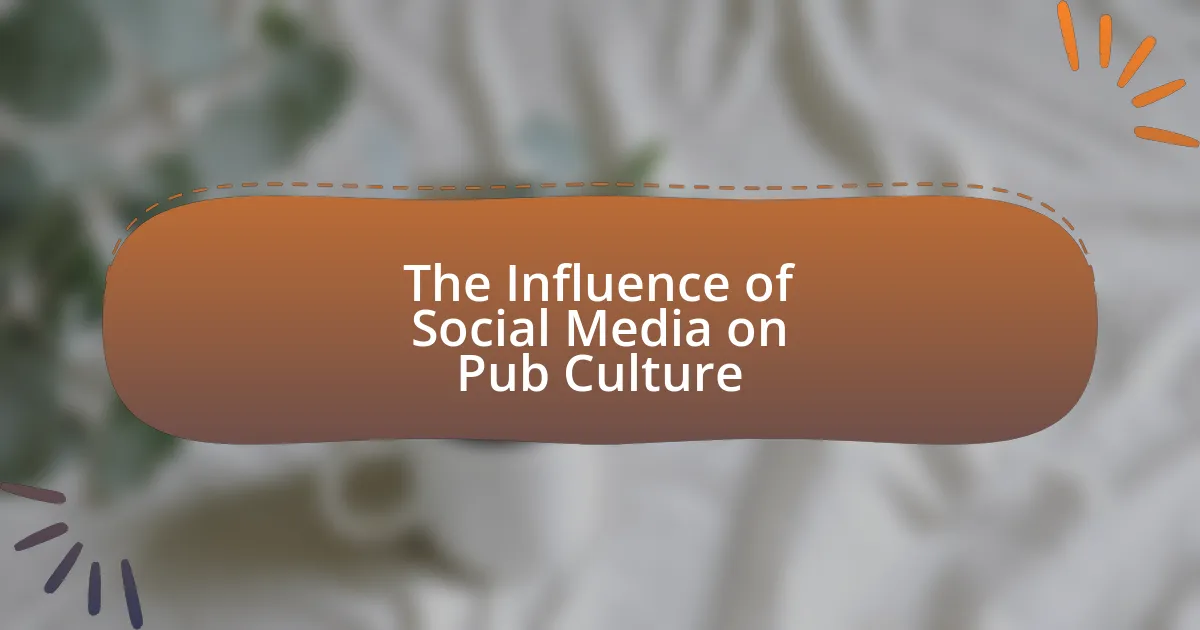The article examines the significant influence of social media on pub culture, highlighting its impact on social interactions, marketing strategies, and customer engagement. It discusses how platforms like Instagram and Facebook shape patrons’ choices, enhance community building, and promote events, while also addressing the dual effects of social media on the pub experience. Key topics include the effectiveness of visual content, the role of online reviews, and the challenges pubs face in managing their reputation in the digital age. Additionally, the article outlines best practices for pubs to leverage social media for positive outcomes and the tools available to measure their effectiveness.

What is the Influence of Social Media on Pub Culture?
Social media significantly influences pub culture by shaping social interactions, marketing strategies, and customer engagement. Pubs now utilize platforms like Instagram and Facebook to promote events, share user-generated content, and attract a younger demographic. According to a study by the University of Kent, 70% of young adults reported that social media influenced their choice of pub, highlighting its role in decision-making. Additionally, social media fosters a sense of community among patrons, as users share experiences and recommendations, further enhancing the pub’s visibility and appeal.
How has social media changed the way people interact in pubs?
Social media has transformed interactions in pubs by facilitating real-time communication and enhancing social connectivity among patrons. This shift allows individuals to share experiences instantly, such as posting photos or checking in at venues, which can attract more visitors and create a sense of community. Research indicates that 79% of social media users report that they engage with friends and family through these platforms while at social venues, highlighting the integration of online and offline interactions. Additionally, social media platforms often serve as a tool for pubs to promote events and special offers, further influencing customer engagement and attendance.
What specific social media platforms are most influential in pub culture?
Instagram and Facebook are the most influential social media platforms in pub culture. Instagram’s visual-centric approach allows pubs to showcase their ambiance, food, and drinks, attracting customers through appealing imagery. According to a study by the National Restaurant Association, 30% of consumers reported that social media influences their choice of dining and drinking establishments, highlighting Instagram’s role in shaping pub culture. Facebook, with its event promotion features and community engagement tools, enables pubs to connect with local patrons, share events, and foster a sense of community, further solidifying its influence in the pub scene.
How do social media interactions enhance or detract from the pub experience?
Social media interactions enhance the pub experience by fostering community engagement and increasing customer loyalty. When patrons share their experiences online, it creates a sense of belonging and encourages others to visit, as evidenced by a study from the Journal of Hospitality Marketing & Management, which found that 70% of consumers are influenced by social media when choosing a venue. Conversely, social media can detract from the pub experience by promoting distractions, as individuals may focus more on capturing moments for online sharing rather than enjoying the atmosphere and interactions in real-time. This dual impact highlights the complex role social media plays in shaping pub culture.
What role does social media play in promoting pubs and events?
Social media plays a crucial role in promoting pubs and events by providing a platform for real-time engagement and targeted marketing. Pubs utilize social media to share event details, special offers, and updates, reaching a wider audience quickly. According to a study by the Pew Research Center, 69% of adults in the U.S. use social media, making it an effective tool for pubs to connect with potential customers. Additionally, user-generated content, such as reviews and photos, enhances visibility and credibility, influencing consumer decisions. This dynamic interaction fosters community engagement and drives foot traffic to pubs during events.
How do pubs utilize social media for marketing purposes?
Pubs utilize social media for marketing purposes by engaging with customers, promoting events, and sharing content that enhances their brand visibility. They create targeted advertisements on platforms like Facebook and Instagram to reach specific demographics, often showcasing special offers or upcoming events to attract patrons. For instance, a survey by the National Restaurant Association found that 70% of consumers are influenced by social media when deciding where to eat or drink, highlighting the effectiveness of these marketing strategies. Additionally, pubs often use user-generated content, encouraging customers to share their experiences online, which further amplifies their reach and fosters community engagement.
What types of content are most effective for engaging pub-goers on social media?
Visual content, particularly high-quality images and videos showcasing food, drinks, and events, is most effective for engaging pub-goers on social media. Research indicates that posts with visuals receive 94% more views than text-only posts, making them crucial for attracting attention. Additionally, user-generated content, such as customer photos and testimonials, fosters community engagement and authenticity, leading to increased interaction. Promotions, such as special offers or event announcements, also drive engagement, as they provide direct incentives for followers to visit the pub.
Why is social media important for community building in pubs?
Social media is important for community building in pubs because it facilitates engagement and connection among patrons. By using platforms like Facebook and Instagram, pubs can share events, promotions, and updates, which encourages interaction and fosters a sense of belonging among customers. Research indicates that 70% of consumers feel more connected to brands that engage with them on social media, highlighting its role in creating community ties. Additionally, social media allows for real-time feedback and communication, enabling pubs to respond to customer needs and preferences, further strengthening community bonds.
How does social media foster a sense of community among pub patrons?
Social media fosters a sense of community among pub patrons by enabling real-time interaction and engagement, allowing individuals to share experiences, events, and promotions. This platform facilitates connections through features such as event pages, group discussions, and user-generated content, which encourage patrons to participate in communal activities. For instance, a study by the Pew Research Center found that 69% of adults in the U.S. use social media, which enhances their ability to connect with others who share similar interests, including local pub events. This connectivity not only strengthens existing relationships but also helps in forming new ones, creating a vibrant community atmosphere within the pub culture.
What are the implications of online reviews and ratings for pubs?
Online reviews and ratings significantly impact pubs by influencing customer perceptions and decision-making. Positive reviews can enhance a pub’s reputation, leading to increased foot traffic and higher sales, as studies show that 84% of people trust online reviews as much as personal recommendations. Conversely, negative reviews can deter potential customers, with 94% of consumers stating that a negative review has convinced them to avoid a business. Additionally, online ratings can affect a pub’s visibility on platforms like Google and Yelp, where higher-rated establishments are more likely to appear in search results, further influencing customer choices.

What are the negative impacts of social media on pub culture?
Social media negatively impacts pub culture by reducing face-to-face interactions and fostering a culture of distraction. The prevalence of smartphones in social settings leads to patrons engaging more with their devices than with each other, diminishing the communal experience that pubs traditionally offer. Research indicates that 70% of people use their phones while socializing, which can lead to feelings of isolation among individuals present. Additionally, social media can create unrealistic expectations about social gatherings, as curated online representations of nightlife may pressure individuals to conform to certain standards, ultimately detracting from the authentic enjoyment of pub culture.
How can social media lead to negative experiences in pubs?
Social media can lead to negative experiences in pubs by amplifying negative reviews and incidents, which can deter potential customers. When patrons share unfavorable experiences online, such as poor service or unruly behavior, these posts can quickly spread, influencing public perception. A study published in the Journal of Hospitality and Tourism Management found that 84% of consumers trust online reviews as much as personal recommendations, highlighting the significant impact of social media on consumer choices. Additionally, social media can create a culture of comparison, where individuals feel pressured to showcase an idealized experience, leading to dissatisfaction when reality does not meet expectations.
What are the risks of misinformation about pubs on social media?
Misinformation about pubs on social media poses significant risks, including damage to reputation, loss of business, and public health concerns. When false information circulates, it can lead to negative perceptions of a pub, resulting in decreased patronage and financial losses. For instance, if a pub is falsely reported to have health violations, potential customers may avoid it, impacting its revenue. Additionally, misinformation can spread rumors about events or promotions that do not exist, leading to customer dissatisfaction and mistrust. Furthermore, during health crises, inaccurate information regarding safety measures can endanger public health, as patrons may not adhere to necessary precautions. These risks highlight the importance of accurate information dissemination in maintaining the integrity and safety of pub culture.
How does social media contribute to the decline of face-to-face interactions in pubs?
Social media contributes to the decline of face-to-face interactions in pubs by providing alternative platforms for socializing that reduce the need for in-person gatherings. As individuals increasingly engage with friends and communities online, they often choose to communicate through social media rather than meeting in physical spaces like pubs. Research indicates that 54% of people prefer online interactions over in-person ones, which highlights a significant shift in social behavior. This trend is further supported by the rise of mobile applications that facilitate virtual connections, leading to decreased patronage in traditional social venues such as pubs.
What challenges do pubs face due to social media influence?
Pubs face significant challenges due to social media influence, primarily in managing their reputation and customer expectations. Negative reviews and posts can quickly spread, impacting public perception and potentially leading to decreased foot traffic. For instance, a study by the Pew Research Center found that 79% of adults in the U.S. have shared their experiences with businesses on social media, indicating that customer feedback can significantly influence potential patrons. Additionally, pubs must constantly adapt to trends and customer preferences showcased on platforms like Instagram and Facebook, which can lead to increased operational pressures and the need for continuous marketing efforts.
How do pubs manage their online reputation in the age of social media?
Pubs manage their online reputation in the age of social media by actively monitoring and responding to customer reviews and feedback across various platforms. This involves utilizing social media tools to track mentions and comments, allowing pubs to address negative feedback promptly and engage positively with satisfied customers. According to a survey by BrightLocal, 87% of consumers read online reviews for local businesses, highlighting the importance of maintaining a positive online presence. By implementing strategies such as encouraging patrons to leave reviews and showcasing positive customer experiences, pubs can enhance their reputation and attract new customers.
What strategies can pubs implement to mitigate negative social media impacts?
Pubs can implement proactive communication strategies to mitigate negative social media impacts. By actively engaging with customers online, pubs can address concerns promptly, clarify misunderstandings, and showcase positive experiences. For instance, responding to negative reviews within 24 hours can significantly improve public perception, as studies show that timely responses can lead to a 33% increase in customer satisfaction. Additionally, creating a dedicated social media policy that outlines how staff should handle negative comments can ensure consistency and professionalism in responses. This approach not only helps in managing the pub’s reputation but also fosters a sense of community and trust among patrons.

How can pubs effectively leverage social media for positive outcomes?
Pubs can effectively leverage social media for positive outcomes by engaging their audience through targeted content, promotions, and community interaction. By creating visually appealing posts that showcase events, special offers, and unique menu items, pubs can attract more customers and enhance their brand visibility. For instance, a study by Sprout Social found that 70% of consumers are more likely to use a business if they see it actively engaging with its audience on social media. Additionally, utilizing user-generated content, such as customer photos and reviews, can foster a sense of community and encourage repeat visits. By analyzing engagement metrics, pubs can refine their strategies to better meet customer preferences, ultimately leading to increased foot traffic and sales.
What best practices should pubs follow on social media?
Pubs should engage their audience consistently on social media by posting regular updates, promotions, and events. This practice helps maintain visibility and fosters community interaction. For instance, a study by Sprout Social indicates that brands that post frequently see a 50% increase in engagement compared to those that post less often. Additionally, pubs should utilize high-quality visuals and videos to showcase their atmosphere, food, and drinks, as posts with images receive 94% more views than text-only posts. Furthermore, responding promptly to customer inquiries and feedback enhances customer satisfaction and loyalty, with 70% of consumers stating that they feel more connected to brands that respond to them on social media. Lastly, leveraging user-generated content, such as customer photos and reviews, can build authenticity and trust, as 79% of consumers say user-generated content highly impacts their purchasing decisions.
How can pubs create engaging content that resonates with their audience?
Pubs can create engaging content that resonates with their audience by leveraging social media platforms to share authentic stories, promote events, and interact with customers. By showcasing behind-the-scenes content, such as staff highlights or the brewing process, pubs can foster a sense of community and connection. Additionally, hosting themed nights or live music events and promoting them through targeted social media campaigns can attract local patrons. Research indicates that 70% of consumers feel more connected to brands when they engage with them on social media, highlighting the importance of interaction in building loyalty.
What role does customer feedback play in shaping social media strategies for pubs?
Customer feedback plays a crucial role in shaping social media strategies for pubs by providing insights into customer preferences and experiences. This feedback allows pubs to tailor their content, promotions, and engagement tactics to better meet the needs of their audience. For instance, a study by Sprout Social found that 79% of consumers prefer brands that respond to their feedback on social media, indicating that active engagement based on customer input can enhance brand loyalty and customer satisfaction. By analyzing feedback trends, pubs can identify popular events, menu items, or service aspects, enabling them to create targeted marketing campaigns that resonate with their patrons.
What tools and resources are available for pubs to enhance their social media presence?
Pubs can enhance their social media presence using tools such as Hootsuite, Buffer, and Canva. Hootsuite and Buffer allow pubs to schedule posts, track engagement, and analyze performance across multiple platforms, which is essential for maintaining a consistent online presence. Canva provides design templates for creating visually appealing graphics tailored for social media, helping pubs attract more followers and engage their audience effectively. According to a 2021 survey by Sprout Social, 73% of marketers believe that social media marketing has been effective for their business, highlighting the importance of these tools in driving engagement and visibility for pubs.
Which analytics tools can help pubs measure their social media effectiveness?
Pubs can measure their social media effectiveness using tools like Hootsuite, Sprout Social, and Google Analytics. Hootsuite allows pubs to track engagement metrics across multiple social media platforms, providing insights into audience interactions and content performance. Sprout Social offers detailed analytics on post engagement, audience demographics, and social listening, enabling pubs to refine their marketing strategies. Google Analytics can track referral traffic from social media to the pub’s website, helping to assess the impact of social media campaigns on customer visits. These tools collectively provide comprehensive data that helps pubs understand their social media performance and optimize their outreach efforts.
How can pubs collaborate with influencers to boost their social media reach?
Pubs can collaborate with influencers by hosting events or tastings that influencers can promote on their social media platforms. This strategy allows pubs to leverage the influencers’ established audiences, increasing visibility and engagement. For instance, a study by the Digital Marketing Institute found that influencer marketing can yield an ROI of up to 11 times the initial investment, demonstrating its effectiveness in reaching broader audiences. By creating unique experiences that influencers can share, pubs can enhance their social media presence and attract new customers.
What are some practical tips for pubs to thrive in the social media landscape?
Pubs can thrive in the social media landscape by actively engaging with their audience, showcasing unique offerings, and leveraging user-generated content. Engaging with customers through regular posts, responding to comments, and hosting interactive events can foster a sense of community and loyalty. Showcasing unique offerings, such as special drinks or themed nights, can attract attention and encourage sharing among patrons. Additionally, leveraging user-generated content, like reposting customer photos or reviews, can enhance credibility and reach, as studies show that 79% of consumers trust user-generated content as much as personal recommendations.
